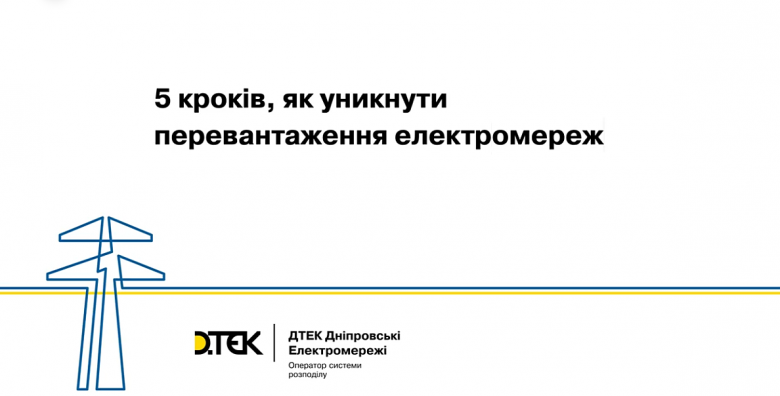TOP-5 energy efficiency tips for winter from DTEK Dnipro Grids

Each residential building is designed and built taking into account certain calculated values of the load on the network. If the load exceeds the norm, there may be problems and accidents in the power networks both in-house and external ones, supplying houses and even the whole quarters. Having many energy-intensive electrical appliances switched on simultaneously (heating devices, water heaters, air conditioners, microwave ovens, electric kettles, etc.), the required power for their operation increases tenfold. Electrical networks that are not designed for such loads operate in emergency mode, and this can lead to a blackout.
“DTEK serves the interests of Ukraine, ensures the reliability of power supply and customer comfort. We strengthen the networks in advance and carry out their upgrade. However, in winter, because people are switching on many energy-intensive devices simultaneously, the networks are overloaded, which increases the risk of an accident. This is most often because customers exceed their contractual capacity and use energy-intensive equipment in excess of the permissible transmission capacity of the electricity network. To avoid this, we recommend a rational approach to power consumption or, if there is such a need, to increase your contractual capacity for a house or apartment,” says Andrii Tereschiuk, DTEK Dnipro Grids CEO.
TOP 5 energy efficiency tips to avoid network congestion:
1) When buying household appliances, choose energy efficient appliances. As a rule, manufacturers indicate the device output. The lower, the better. Particular attention should be paid to energy-consuming devices: convector, electric ovens, refrigerator, boiler, electric kettle, iron.
2) Distribute the load. Turn on the most power hungry appliances one at a time. This is especially important for houses built before 2000. Their in-house networks are usually not designed for high loads.
3) Try to avoid peak load hours. Usually this time is from 7:00 to 11:00 and from 20:00 to 22:00. These hours are the peak of the simultaneous load on the network and the excess both in a single apartment and in the area.
4) Switch to night power mode. Whenever possible, use heating appliances, dishwashers and washing machines at night. This will avoid emergency load surges.
5) Ensure that you have the contact details of an electrician, because if the problem is within the house, a person responsible for the in-house networks should resolve an issue:
- In an apartment building, such a person is a balance holder or a manager of your house (condominium, management company, etc.);
- In a private house - an owner of the property;
- On the street or in the area - you need to contact DTEK Dnipro Grids;
If you have light cutoff due to overload, turn off all energy-consuming devices and turn on the circuit breaker. If the light continues to knock out, contact an electrician. Do not try to restore it yourself, it is dangerous!
If there is a need to increase the contractual capacity for your house or apartment, there is an option of submitting a request online via the DTEK Dnipro Grids website. During a pandemic, our company provides services remotely.

